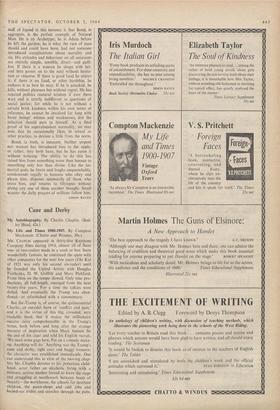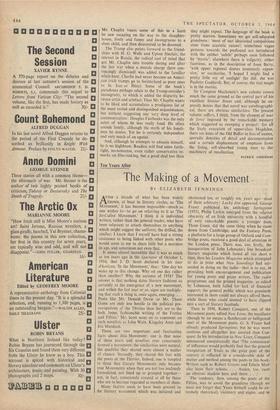Cane and Derby
MR. CHAPLIN appeared in thirty-five Keystone Company films during 1914, almost all of them one- or two-reelers made in a week or less. Soon wonderfully famous, he continued the spate with other companies for the next few years (The Kid of 1921 was only his second six-reeler) until he founded the United Artists with Douglas Fairbanks, D. W. Griffith and Mary Pickford. From then, on the tempo slowed. Only nine pro- ductions, all full-length, emerged from the next twenty-five years. For a time the talkies were defied. And eventually the Tramp was aban- doned—or refurbished with a commentary.
But the Tramp is, of course, the quintessential Charlie, an outsider born of 'conflict and pain,' and it is the virtue of this big, crowded, very readable book that it makes the millionaire success story comprehensible in the Tramp's terms, both before and long after the strange moment of inspiration when Mack Sennett bit the end of his cigar and told his English recruit, 'We need some gags here. Put on a comedy make- up. Anything will do.' Anything was the Tramp's cane and derby, tight coat and baggy trousers;
, the character was established immediately. One can understand this in view of the moving chap- ters Mr. Chaplin devotes to his penurious child- hood, actor father an alcoholic living with a mistress, actress mother, forced to leave the stage
• and struggling at needlework between bouts of insanity—the workhouse, the schools for destitute children, the pawn-shops and odd jobs and locked-out nights and searches through the pubs.
Mr. Chaplin traces some of this to a lamb he saw escaping on the way to the slaughter- house, lively and funny and incongruous to a slum child, and then discovered to be doomed.
The Tramp also points forward to the friend- ships with H. G. Wells and Upton Sinclair, the interest in Russia, the radical cast of mind that got Mr. Chaplin into trouble during and after the last war when a morals charge (here con- vincingly dismissed) was added to the familiar witch-hunt. Charlie had never become an Ameri- can (rich tramps go to Switzerland as poor ones to St. Ives or Ibiza). Some of the book's paradoxes perhaps relate to the Tramp-outsider's incongruity, to which is added the disparity be- tWeen artist and artefact. Thus Mr. Chaplin wants to be liked and accumulates a prodigious list of the most varied and distinguished acquaintances, but without suggesting any very deep level of communication: Douglas Fairbanks was the only actor of whom he was really fond. He often sounds lonely, although the myth of his loneli- ness he denies. Yet he is certainly independent and very much of an egotist.
And, although he attempts to educate himself, he is no highbrow. Readers will find some forth- right, no-nonsense, even rather conservative re- marks on film-making, but a good deal less than they might expect. The language of the book is pretty uneven. Sometimes we get self-educated grandness: 'most of our ideational compulsions stem from atavistic causes'; sometimes vague gestures towards the profound are introduced with the epithet 'subtle' perhaps soon followed by 'mystic'; elsewhere there is vulgarity, either facetious, as in the description of Joan Barry, 'with upper regional domes immensely expan- sive,' or saccharine, 'I hoped I might find a pretty little ray of sunlight' (he did; she was Paulette Goddard). But, of course, the real magic is in the movies.
Sir Compton Mackenzie's new volume covers much the same ground as the central part of his excellent Sinister Street and, although he ex- pressly denies that that novel was autobiographi- cal, there are obvious similarities. The present volume suffers, I think, from the element of tour de force imposed by the remarkable memory which suggested so sweeping a project: for all the lively evocation of upper-class Magdalen, there are hints of the Old Buffer in lists of names, sporadic densities of detail and documentation and a certain displacement of emphasis from the living, self-absorbed young man to the machinery of recollection.
PATRICK ANDERSON















































 Previous page
Previous page